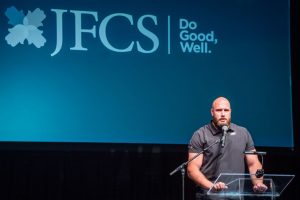
For Eagles offensive lineman Lane Johnson, his toughest opponent isn’t the Cowboys or the Chiefs. It’s himself.
On the field, the All-Pro player has experienced the highest highs of the sport, but off the field, Johnson has struggled with depression and anxiety, which caused him to sit out of three games in 2021.
Johnson shared his story of navigating mental health issues at the Jewish Family and Children’s Service of Greater Philadelphia’s Center Stage event for donors on May 2.
“What I’m really trying to do with my story is to inspire people, to inform people and to make it possibly better for families, for parents and their children and make it something that’s talked about more and, I feel like, faced rather than feared,” Johnson said at the event.
Johnson, 33, has worn midnight green since 2013, helping the team secure a Super Bowl victory in 2018. He holds the NFL record for most consecutive games without allowing a sack at 26 games. His accolades don’t necessarily reflect his struggles.
Struggling with depression and anxiety while playing on his high school football team in Groveton, Texas, Johnson battled with perfectionism and the pressure of playing at the top of his game in a town with a big football culture. He was diagnosed with anxiety while attending the University of Oklahoma.
Johnson injured his ankle at the end of 2018 and underwent a minor procedure, but in 2020, he played seven games before having to get surgery again. Johnson noticed a dip in performance which triggered intense anxiety: He couldn’t run as efficiently and didn’t put full trust in his foot.
“When you excel at something, you have a sort of standard to play at, and internally, when that’s not met, it can create a lot of turmoil,” he said. “So that was what was going on in my mind.”
Around the same time, he experienced tremendous side effects after he stopped taking an antidepressant.
“What I was going through was severe withdrawal effects,” he said. “Nausea, vomiting, tremors in my hands and, really, the inability to focus or carry on just really ordinary tasks. I felt like every day, it was a challenge. … I needed to really reassess my career.”
In 2021, Johnson took a break after a Week 3 loss to the Cowboys and returned three games later. The Eagles went 7-3 over the rest of the season.
Today, Johnson has a mental performance coach in Brian Cain, who works with athletes in the NBA, NFL, NHL, MLB and PGA. He learned to treat anxiety as a motivator and performance tool.
“We all see anxiety as a negative, and it can be if you let it take over your life,” Johnson said. “But as a performer, [Cain] always says that anxiety is like a fire. Fire could do wonders for us, keeping us alive, but obviously, if it gets out of order, it can destroy your life.”
Recognizable as one of the players in a dog mask — alongside then-defensive end Chris Long — ahead of the 2018 Super Bowl, Johnson believes in the power of the underdog. He’s spoken about his battle with mental illness in depression treatment centers and on Instagram.
The best way to address mental health struggles is to first acknowledge that they exist. Educating people on the importance of mental health is the first step, Johnson argued: “No conversation is too small.”
JFCS featured Johnson as part of their major donor event focused this year on mental health to address a “growing mental health crisis,” according to Christina Comenos, counseling program director for JFCS of Greater Philadelphia.
The event began with brief speeches by social worker Michael Byrne, art therapist Kiarra Williams, JFCS’ LGBTQ initiative program manager Galia Godel and JFCS’ Parenting Education supervisor Lynette Ellis, each representing a community JFCS helps to serve.
“Supporting the mental health of our clients is the underpinning of everything we do here at JFCS – whether providing food or financial assistance, referrals for resources, adoption services and more,” Comenos said. “Because mental health challenges can jeopardize all other areas of life, there is no crisis or life transition where an individual’s mental health isn’t prioritized by our social workers.”
JFCS works with older adults to address feelings of isolation, death, illness, conflicts with children and more, with a focus on positive aging. Their Mental Health Network helps address barriers, such as costs, clients may have in accessing mental health services. JFCS’ youth programs work with young people struggling with self-harm and suicidal ideation and can offer free pediatric care for those at or below 250% of the federal poverty guidelines.
“Mental health is a thread that runs through everything that we do for the community we serve,” Comenos said.






